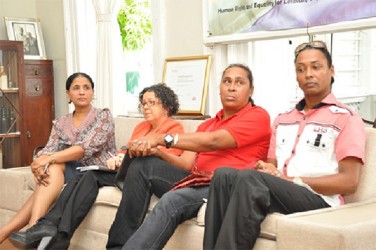A debriefing session on last year’s 20th Inter-national AIDS Conference on Thursday heard the importance of advocacy to spotlight often-forgotten minority groups, like transgender persons.
“It is essential that minority groups have a voice, one that is heard and in a positive way; a voice that consistently demands rights,” Transgender Com-munity Advocate from Region 3 Antonio Paul told the session, which was hosted at Moray House in Georgetown by the Society Against Sexual Orientation Discrimination (SASOD) and the Joint United Nations Programme on AIDS (UNAIDS).
According to a statement released by SASOD, Paul, who was part of the national delegation attending the International AIDS Conference in Melbourne, Australia last year, told the session that the conference gave him a broader perspective on the challenges facing transgender communities. It was noted that even in countries where laws protect transgender individuals, they are still faced with a plethora of issues.

Thursday’s session provided a platform for representatives from the national delegation who attended the conference to present and share how they are implementing the lessons learnt from the conference, discuss their progress with other key stakeholders, including the media, and allow an opportunity for questions and feedback from stakeholders, according to the statement.
It was moderated by SASOD’s Managing Director Joel Simpson and featured four panelists who formed part of the national delegation attending the conference, including Paul. The others panelists were Dr. Ruth Ramos, Director of the National Care and Treatment Centre, at the Ministry of Health; Dr. Shanti Singh-Anthony, Programme Manager of the National AIDS Programme Secretariat, at the Ministry of Health; and Royston Savory, Preven-tion Officer at Family Awareness Consciousness Togetherness (FACT) in Corriverton, Berbice.
Dr. Singh-Anthony, according to the report on her presentation, found the conference insightful because it made her aware that more often than not children and young people are being left behind in care and treatment programmes. “Greater emphasis is being placed in the paediatric and adolescent programmes to include and ensure the adequate and appropriate management of children who are eligible for anti-retroviral treatment. The National AIDS Programme Secretariat (NAPS) also intends to factor in the dynamics of working with adolescents to ensure better services and better quality of life,” she was quoted as saying in the statement.
She also said NAPS will continue to think of innovative ways of reaching key populations. She also expressed gratitude for the information that is coming forward about transgender persons, while noting that this will help NAPS to understand and better serve the “long-neglected and stigmatised” minority group.
Dr. Ramos added that the ultimate goal of the National Care and Treat-ment Centre is to target and test everyone, while adding that it is also working assiduously on not just decreasing, but eliminating, mother-to-child transmission. She also said one of the greatest challenges that the Centre faces is adherence to medication and keeping patients on care.
Meanwhile, SASOD said the panel discussion was followed by questions from the gathering. Dr. Yoran Grant-Greene, Country Director of the US Centre for Disease Control in Guyana, asked the panelists to pinpoint, if any, any peer-to-peer strategies or methods for working and reaching key populations discussed at the conference. Simpson, the statement said, mentioned the use of information and communication technologies (ICT) as a platform for interventions to reach key populations with HIV prevention information. He also called on the donor community to support more of these kinds of innovative initiatives that would enable community groups to use ICT in their work. Savory also noted the use of social networking in the Berbice area.
At Thursday’s session, SASOD also received a cheque for winning the Red Ribbon Award in the category of human rights and advocacy.
UNAIDS Country Director Dr. Roberto Brant Campos presented SASOD with a cheque for US$10,000 for winning the award. “In a world where, as we all know, LGBT [Lesbian, Gay, Bisexual and Transgender] communities are castigated as third-class citizens, having their humanity and dignity frequently denied, and their rights not respected, [it] is an honor to present this prize given to SASOD. It is more than recognition of its excellent work; it is a symbolic prize to all LGBT communities, not only in Guyana but in the whole Caribbean region and a stimulus to them to pursue in their quest for a better world for all; and, specifically, for a world without AIDS,” Campos was quoted as saying.
SASOD said the prize money from the Red Ribbon Award will go towards its LGBT Community Centre Fund. It explained that the multi-purpose LGBT Community Centre is to serve as the secretariat for SASOD, provide office space for other LGBT groups and provide temporary housing for LGBT youths facing homelessness as well as other services to LGBT Guyanese. The group also welcomed public donation to its LGBT Community Centre Fund either at its Charlotte Street office or directly through Scotiabank Account Number 10024548.





